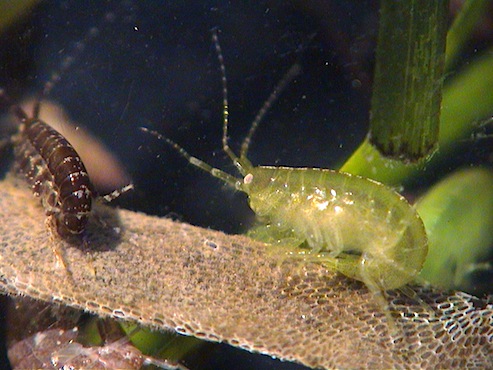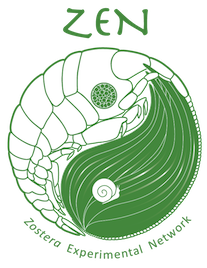Welcome to ZEN
ZEN is a collaborative partnership among ecologists throughout the northern hemisphere conducting coordinated research in beds of eelgrass (Zostera marina) to tackle big questions about how biodiversity, climate change, and natural variability across the globe influence ecosystem structure and functioning. ZEN’s primary funding comes from the National Science Foundation, but benefits from in-kind support from partner institutions throughout the world. Watch the video above to hear ZEN’s lead scientist, Dr. Emmett Duffy, discuss the project and some emerging results.
From buckets to biosphere
Building on a history of small-scale experiments in seagrass systems, the goal of ZEN is to advance the science of food-web ecology in seagrass systems from “buckets to the biosphere”, that is, from laboratory and mesocosm experiments to global gradients. Our approach involves controlled field experiments, run in parallel at all partner sites, that exclude small crustacean grazers (called “mesograzers”) and add fertilizer to plots in beds of the underwater grass Zostera marina. Using meta-analysis and structural equation modeling (SEM), we can rigorously compare results across broad ranges of latitude, environmental conditions, and biological diversity to gain a global perspective on how nutrient pollution and changing biodiversity impacts key ecological processes. The ultimate goal of our international collaboration is to provide new knowledge that will improve management and conservation of coastal habitats and thehuman communities that depend on them.
Why seagrass? Why Zostera marina?
Seagrasses in most coastal regions around the world are declining, leading to losses of the critical habitat and services they provide. Seagrasses play a key role in coastal ecosystems, providing important services including nursery habitat and a home for fish and shellfish species, stabilizing the sediment and reducing shoreline erosion, soaking up nutrients, and biofiltration that improves water clarity.
Eelgrass, Zostera marina, is widely distributed in estuaries throughout the northern hemisphere. Not to be confused with seaweed, eelgrass is a marine angiosperm — a flowering plant — that lives in the water. Its abundance, ecological importance, and wide range throughout the northern hemisphere makes it an ideal species for studying the influence of climatic and biogeographical gradients on ecological processes.



[...] the word about the ZEN partnership and project (see the College of William and Mary’s video here) and to highlight some of the cool things we’re doing. Honestly, I think ZEN is the most [...]